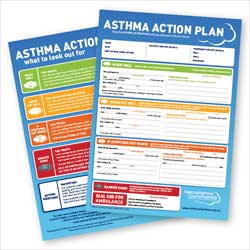Asthma is a chronic disease that affects your airways. Your airways are tubes that carry air in and out of your lungs. If you have asthma, the inside walls of your airways become sore and swollen. That makes them very sensitive, and they may react strongly to things that you are allergic to or find irritating. When your airways react, they get narrower and your lungs get less air.
Living with Asthma: A Complete Guide to Managing the Disease
Have you suffered from asthma since you were a child? Maybe you’ve recently received an asthma diagnosis, or are the parent, caregiver, or teacher of a child who has been diagnosed with this common respiratory illness.
By learning more about asthma and its risk factors, symptoms, causes, and treatment, you can prevent attacks and improve your or your child’s quality of life.
Our guide to living with asthma is constantly growing. Bookmark this page to access the latest asthma resources and lead a healthier, more active life.
 Helpful Tips For Managing Stress And Asthma
Helpful Tips For Managing Stress And Asthma
Did you know that stress can increase the frequency and intensity of your asthma symptoms?
While we all experience stressful events in life, the effects of stress can be particularly debilitating for people who suffer from asthma.
Read on to learn how to manage day-to-day stress so that it doesn’t aggravate your asthma symptoms.
 Asthma Medications Explained
Asthma Medications Explained
Asthma medication is one of the easiest and most effective ways to keep your symptoms under control. Do you understand the difference between controller medications and quick-relief inhalers?
When it comes to treating both day-to-day asthma symptoms and occasional asthma attacks, knowing what to take and when couldn’t be more important
Learn more here about the different medications used to treat asthma.
 Common Warning Signs and Triggers of Asthma
Common Warning Signs and Triggers of Asthma
Do you tend to cough and hack in the morning, just after you wake up? Or, perhaps you’ve noticed an unusual sensation of pressure in your chest? If so, it may be time to see a doctor.
Learn more here about the common triggers of symptoms in asthmatics.
 How To Manage An Asthma Attack
How To Manage An Asthma Attack
During an asthma attack, you might feel like you can’t breathe, your first response will likely be to panic.
Learning more about the early warning signs and your medications can help you to stay calm in the event of an emergency. Developing an asthma action plan with your doctor is crucial.
Find out how to prepare yourself and handle an asthma attack with these six simple steps.
Asthma affects millions of Canadians, both young and old. The first step in learning how to lead a full and active life with asthma is education.
Once you understand your personal triggers and symptoms, you can work with your doctor to come up with an action plan. Take control over your asthma symptoms by accessing our asthma resources today.
JoinAStudy only uses trusted resources that are part of Health On The Net Code (HONcode) as we only want to provide quality health information to professionals and the general public.
Trusted Resources:
- Adult-Onset Asthma
- American Academy of Allergy Asthma & Immunology
- Anticholinergics for Asthma
- Asthma Attack Causes
- Asthma Action Plan
- Asthma and Allergy Foundation of America
- Asthma Facts and Statistics
- Asthma in Older Adults
- Asthma Medications: Know Your Options
- Asthma: Quick-Relief Drugs
- Asthma Society of Canada
- Asthma: The Rescue Inhaler—A Cornerstone of Asthma Treatment
- Asthma Triggers and Management
- Common Asthma Triggers
- Exercise-Induced Asthma
- Healthline: Peak Expiratory Flow Rate
- How To Use Your Peak Flow Meter
- Immunomodulators for Asthma
- Inhaled Corticosteroids for Long-Term Control of Asthma
- Leukotrienes and Asthma
- Long-Term Control Medications Used To Treat Asthma
- Mayo Clinic Diseases and Conditions: Asthma
- Mayo Clinic: Stress Management
- Medline Plus Asthma Center
- National Sleep Foundation: Sleeping Tips
- Nebulizers: Home and Portable
- Non-Steroidal Anti-Inflammatory Drugs
- Non-Cardioselective Beta Blockers
- Physical Exercise and Stress
- Prednisone
- Sample Asthma Action Plan
- Sulphites
- Treatment & Self-Care
- WebMD Asthma Center
- What Are Lung Function Tests?
- What To Do If Your Asthma Worsens

